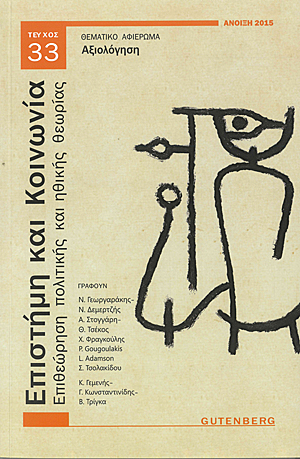New Public Management Regime and Quality in Higher Education
Περίληψη
A spectre has been haunting the public administration of Western countries –the spectre of New Public Management. This has been all too visible for quite a while, and it coincides with the increasing prevalence of a producing and consuming neo-liberal ideology that has profoundly pervaded all aspects of society, culture and the economy in the current information and globalization era, the dawn of which took place in the early 1970s (Borg & Mayo 2005; Castells 2000; Lengrand 1970). The education sector, and the universities in particular, were no exception. Their alleged autonomy was invaded by neo-liberal ‘forces’ and changed to the point beyond recognition, which has seriously violated the employees’ professional integrity and expertise. As the university gradually transformed into a mass educational institution, without being accompanied by a corresponding increase in resources, the academic staff was constantly reminded that the quality of their work must be raised and ultimately assured. Words and phrases as quality assurance, quality indicators, quality and accountability measures, evaluation, learning outcomes, etc., penetrated academic life without the consent of the majority of the employees. Hence, this discursive shift was a new reality, imposed though from the outside. It is therefore not surprising that disagreement within academic circles and opposition from significant segments of the civil society was at times vehement. The introduction of the new control regime was perceived more as a threat than as a democratic development based on collegial consensus.
In the present text, an attempt is made to approach the notion of quality in higher education through the prism of the New Public Management approach.
The main question being addressed is: What exactly do proponents of New Public Management mean by quality in higher education, what does it entail regarding the staff’s professional integrity and development as well as the assurance of the quality of education offered?
Λεπτομέρειες άρθρου
- Πώς να δημιουργήσετε Αναφορές
-
Gougoulakis, P. (2016). New Public Management Regime and Quality in Higher Education. Επιστήμη και Κοινωνία: Επιθεώρηση Πολιτικής και Ηθικής Θεωρίας, 33, 91–113. https://doi.org/10.12681/sas.10265
- Τεύχος
- Τόμ. 33 (2015): Αξιολόγηση
- Ενότητα
- Άρθρα

Αυτή η εργασία είναι αδειοδοτημένη υπό το CC Αναφορά Δημιουργού – Μη Εμπορική Χρήση – Παρόμοια Διανομή 4.0.
Οι Συγγραφείς που δημοσιεύουν εργασίες τους σε αυτό το περιοδικό συμφωνούν στους παρακάτω όρους:- Οι Συγγραφείς διατηρούν τα Πνευματικά Δικαιώματα και χορηγούν στο περιοδικό το δικαίωμα της πρώτης δημοσίευσης ενώ ταυτόχρονα τα πνευματικά δικαιώματα της εργασίας προστατεύονται σύμφωνα με την άδεια Creative Commons Αναφορά Δημιουργού - Μη Εμπορική Χρήση - Παρόμοια Διανομή 4.0 Διεθνές , που επιτρέπει σε τρίτους - αποδέκτες της άδειας να χρησιμοποιούν την εργασία όχι για εμπορικούς σκοπούς, με την προϋπόθεση της διατήρησης των διατυπώσεων που προβλέπονται στην άδεια σχετικά με την αναφορά στον αρχικό δημιουργό και την αρχική δημοσίευση σε αυτό το περιοδικό και με διανομή τυχόν τροποποιήσεων υπό την ίδια άδεια όπως και το πρωτότυπο.
- Οι Συγγραφείς μπορούν να συνάπτουν ξεχωριστές, και πρόσθετες συμβάσεις και συμφωνίες για την μη αποκλειστική διανομή της εργασίας όπως δημοσιεύτηκε στο περιοδικό αυτό (π.χ. κατάθεση σε ένα ακαδημαϊκό καταθετήριο ή δημοσίευση σε ένα βιβλίο), με την προϋπόθεση της αναγνώρισης και την αναφοράς της πρώτης δημοσίευσης σε αυτό το περιοδικό.
- Το περιοδικό επιτρέπει και ενθαρρύνει τους Συγγραφείς να καταθέτουν τις εργασίες τους μέσω διαδικτύου (π.χ. σε ένα ακαδημαϊκό καταθετήριο ή στους προσωπικές τους ιστοσελίδες) πριν και μετά από τις διαδικασίες της δημοσίευσης, καθώς αυτό μπορεί να οδηγήσει σε παραγωγική ανταλλαγή ιδεών και σκέψεων καθώς επίσης και σε γρηγορότερη και μεγαλύτερη χρήση και ευρετηρίαση της δημοσιευμένης εργασίας (See The Effect of Open Access).



